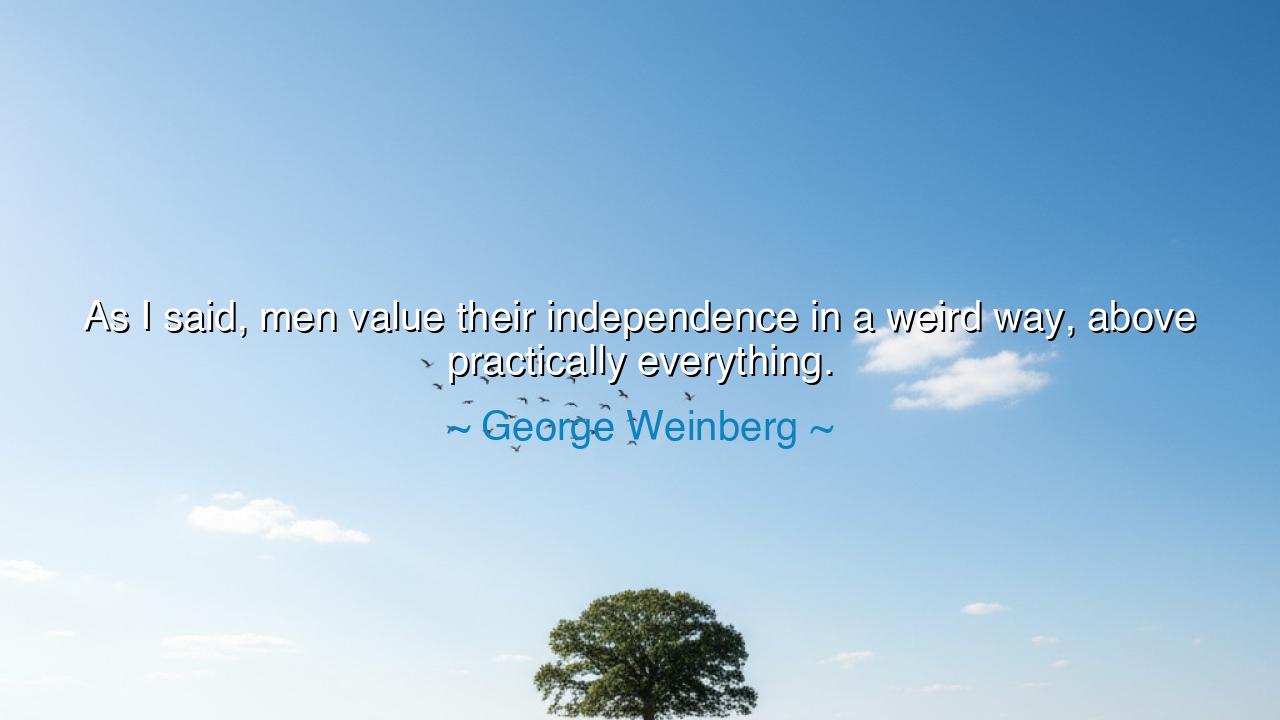
As I said, men value their independence in a weird way, above






“As I said, men value their independence in a weird way, above practically everything.” — George Weinberg
In these perceptive words, George Weinberg, the psychologist and thinker, reveals a truth as ancient as humankind itself — that independence, the yearning to be free and self-directed, burns within the soul of man like a sacred flame. Yet he also calls it weird, for it is not a simple or innocent desire. It is a passion filled with contradictions: noble and destructive, selfless and selfish, empowering and isolating. To value independence above everything is to crave mastery over one’s destiny, but also to risk the loneliness that comes when pride refuses the hand of others. Thus, Weinberg’s words are not condemnation, but a mirror — reflecting both the glory and the burden of humanity’s obsession with freedom.
The meaning of this quote lies in the paradox of the human spirit. From the beginning, man has sought to stand apart — to be the author of his own life. He has defied kings, gods, and even nature itself in pursuit of self-determination. This desire is not evil; it is the root of progress and creativity. Yet, as Weinberg notes, it can become weird, distorted, when it blinds the soul to connection. For when independence turns to isolation, when pride becomes a wall rather than a pillar, man loses the very humanity he sought to preserve. True independence, the ancients knew, is not the absence of bonds, but the mastery of them — to choose one’s duties freely, not to flee from them.
The origin of Weinberg’s insight can be found in his lifelong study of relationships — of how people love, fight, and fail to understand one another. He observed that many men, even in intimacy, feared dependence as though it were a form of weakness. They believed that to lean on another was to lose themselves. In this, he saw the psychological struggle of masculinity — the tension between strength and vulnerability. His words echo through the corridors of modern life, where so many still measure worth by autonomy alone. He invites us to question this, to see that strength without tenderness, independence without compassion, is a lonely kind of victory.
History, too, offers examples of this truth. Consider Achilles, the greatest warrior of the Greeks. His independence, his refusal to be commanded, made him legendary — yet it also doomed him. In his wrath, he withdrew from battle, caring more for his pride than for his people. Only when his friend Patroclus fell did he return, driven not by glory but by grief. Thus, even the hero who valued independence “above practically everything” learned too late that no man stands entirely alone. The bonds we resist are the same bonds that give our lives meaning. Achilles’ independence made him immortal in story, but it cost him the warmth of fellowship in life.
And so too in the story of nations. When America declared her independence from Britain, she sought not isolation, but self-governance — a balance between freedom and interdependence. Yet even this noble act, born of courage, has echoed through centuries with the same paradox: how to remain free without becoming estranged from the world. Weinberg’s wisdom applies not only to men but to nations, to any being that would shape its own fate. Freedom must not be confused with solitude; self-reliance must not harden into arrogance. Independence without empathy is a brittle shield — it may protect the self, but it cannot build a world.
Weinberg’s insight also touches the personal, the quiet struggles within every heart. Many of us fear dependence — fear needing someone, admitting weakness, or yielding control. But life, in its wisdom, humbles us. Illness, loss, age — these remind us that we are bound to one another. Independence is noble, yes, but the truest strength is found in the courage to depend wisely — to trust, to share, to build together. As the oak stands firm only because its roots entwine with others in the soil, so too must man learn that his freedom grows strongest in communion.
Thus, the lesson is this: cherish your independence, but do not worship it. Let it be a flame that lights your path, not a fire that burns your bridges. Be strong enough to stand alone, yet wise enough to stand with others. For no one who truly understands life seeks only to be free — they seek to be whole. Learn to balance the pride of self with the grace of connection. Help others without losing yourself; accept help without shame. This is the middle way, the way of wisdom.
And so, remember these words of George Weinberg: independence, though sacred, becomes strange when prized above love, loyalty, or truth. The wise know that the greatest freedom is not to need no one, but to choose, in strength and awareness, whom to walk beside. For independence without compassion is emptiness; but independence guided by heart — that is the harmony of the human soul.






AAdministratorAdministrator
Welcome, honored guests. Please leave a comment, we will respond soon